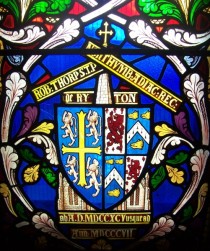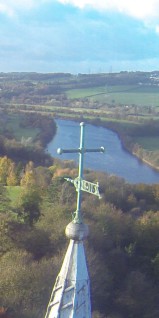Charles Thorp - and the Comprehensive School
Here's the Thorp Crest displayed in stained glass in our chancel windows.
Rector of Ryton for 55 years, Charles Thorp served this community until the year 1862. But much more than that. He did all the ground work for the founding of Durham University, as well as beginning free education for the youth of this district. His passion for social justice took him into the abolitionist movement, and the foundation of Penny Banks. His concern for the environment makes him one of the precurser figures of the National Trust.
In 2011 the governors of Ryton's comprehensive school decided to take up this local story with a new name for the school:
Charles Thorp Comprehensive School.
Tom Jamieson took the opportunity of weeks of Year Group Assemblies at the School, in May and in October 2011, to share with students something of the Charles Thorp story and how it might inspire and challenge us. Here are his talks:
Charles Thorp School: year group assemblies week beginning 16 May 2011.
Sierra Leone is a country in West Africa and its capital is called Freetown. At the time when the Slave Trade was abolished by the British parliament, just over 200 years ago, many who were taken from Africa to be slaves in the West Indies and the United States managed to return there. They named their city “Freetown”. Just 20 years after the Abolition of the Slave Trade, in 1827, a university was set up in Freetown. It’s called Fourah Bay College, it’s still there, thriving as a place of further education, and it’s very proud to be the oldest university in West Africa.
The person who worked hard to set up Fourah Bay College came from Ryton. In fact he had the job which is now my job – he was the Rector of Holy Cross Church. His name was Charles Thorp.
Now here’s a thing about Charles Thorp. He was one of the many who put pressure on their MPs to get the wicked practice of Africans being shipped across the Atlantic to work in plantations outlawed.
But he didn’t leave it at that when the law was changed. He saw that much more needed to be done to enable these people, whose lives had been shattered, to make a new beginning for themselves. His vision was that education was the way to real freedom, real empowerment. And so the project of setting up a university for freed slaves, in Freetown, was born. Charles Thorp saw it through, with the help of the Church Missionary Society of which he was a member.
There’s an old saying, “Go the second mile”. It suggests that, when you’ve done something for the good of someone else, perhaps you’ve only begun – you’ve gone the first mile; and perhaps there’s more you can do for that person, to turn the good you’ve done into a really lasting good. Setting up a university in Freetown, was ‘going the second mile’ for freed slaves.
This week is Christian Aid Week. Loads of members of churches in Britain and Ireland have delivered these* envelopes through people’s letter boxes and will be knocking on those doors through the days of this week inviting people to donate. The money is for all sorts of projects in the poorest countries of the world where local people have a plan to make life better for themselves. But they need some start-up money to make the project happen. On the doorsteps, I find that some people give a lot. Lots of people give a pound or two. And just a few people tell you to clear off; no big deal. I find it’s rewarding, doing my bit for others that way. But it’s only the first mile, because meanwhile I live a comfortable life and Christian Aid Week doesn’t change that for me.
I think it’s worth asking ourselves the question, “What might ‘Go the second mile’ mean for me?” “What lasting difference can I make for someone – whether someone down the street or the other side of the world?” “And will I get out there and do it?”
Christian Aid do some really imaginative prayers and I’ve chosen one for my assembly with you. If you do prayer, you can make these words your own in your heart before God. If not, then I hope the words can inspire you just the same. Here it is:
God of the
impossible,
we pray for justice, peace and reconciliation.
And when the challenges seem too many,
remind us of your resurrection power,
and the miracles of your love that happen
whenever injustice is dismantled and rebuilt with peace.
Help us to hope that the impossible can happen
and live as if it might do so today.
Amen.
Charles Thorp School: year group assemblies week beginning 17 October 2011.
In the Spring I got myself away, me and my bicycle and a tent, to the Western Isles of Scotland for two weeks: wild camping, walking, reading this book called “Barefoot Disciple”. It turned out to be a good choice as there’s a connection, I feel, between being close to the earth and being close with God; a connection between travelling light and going deeper into an understanding of who you are. It was good! - a kind of pilgrimage.
The Western Isles – The Outer Hebrides – wild, awesome. People live there but the landscape forms them and their way of life, not the other way around. That’s rare in the British Isles. I stayed on a croft a couple of nights and got a flavour of their way of life. Mrs MacLeod told me about the Golden Eagles taking some of her chicks – she said, “It’s their right, you see; These are their islands as much as ours”.
In the North East we’ve managed to keep just a few wild places. Or should I say, we’ve managed to rescue a few wild places before it was too late. One of those surely is our own little group of islands, the Farne Islands. Perhaps some of you have been, by small boat from Seahouses on a day when the weather permits.
The Farne Islands, teeming now with Grey Seals – over 3,000 of them!50,000 breeding pairs of Puffins with their amazing beaks, Eider Ducks, Artic Terns on their way from the North to the South Pole, Yes, a wild-life sanctuary. But it wasn’t always so!For a long time it was used as a shooting ground!
It was a man from Ryton who thought the butchering of birds and seals had to stop. His name was Charles Thorp. His family had money, so he persuaded them to part with it and with the cash he bought the Farne Islands! The year was 1861. He bought them, and set up a fund to pay for a Warden of Wildlife. It was decades later that the ideas of conservation and of wild-life sanctuaries took off.
Charles Thorp was ahead of his time – an early eco-warrior even. He planted Holy Cross Churchyard in Old Ryton Village with oak and beech and sweet chestnut – now the huge mature trees we see there today – our own local wildlife sanctuary, with Badger, Woodpecker, and just sometimes Deer.
Judith and I are going to read from one of the Psalms in the Bible. This one celebrates the connectedness of the wild and the tame; ourselves and the other creatures. Mrs MacLeod the Crofter I guess lives by it, as Charles Thorp did. I invite you to imagine yourself into its world view, and allow it to touch your own.
Verses from Psalm 104.



